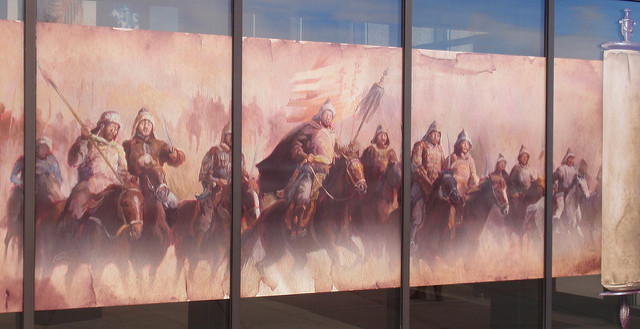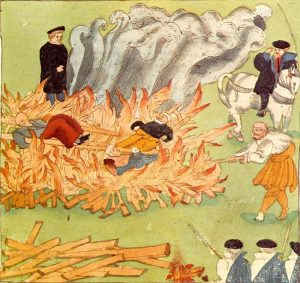Genghis Khan was the savage and ruthless military leader who is credited with unifying much of Eurasia and having founded the world’s largest empire in the thirteenth century. To do so, he led many military campaigns conquering one land after another, and, after the conquering, he declared his rule over the vanquished. Genghis Khan’s image as a ruthless and determined conqueror has often painted the Mongolians he led as being harsh and bloodthirsty. However, he and his armies were also willing to show much mercy.
His oldest but not directly related son was Jochi Khan. Genghis Khan’s wife was kidnapped, and when he rescued her, she had become pregnant with Jochi.1 Despite this fact, however, Genghis Khan never saw him as anything other than his own. Even on his deathbed, he contemplated appointing Jochi as a successor, as it was customary to pick the eldest son. One of Jochi’s step brother’s did not agree to this, being that Jochi wasn’t actually related by blood; Jochi replied to his step brother with, “‘I have never been told by my father the Qan that I was different from my brothers. How can you discriminate against me?”2

As he was treated like one of his father’s own, Jochi was given his own army at the age of twenty-six. This was popular among his family as his father was keen on delegating several military positions to family and friends; this further allowed his sons to develop their leadership skills.3 However, they would still take orders from their father, and Jochi was assigned to take over several villages, cities, and towns. On one of his assignments, Jochi was ordered to take over the town of Saganak around the year 1220.4 Jochi, being a smart man, knowing that he would indeed own the town afterwards, sent a local countryman to ask for the town’s surrender. Surely, he thought, they must receive the message much better coming from one of their own. He even made an agreement with the governor that the messenger would not be harmed nor would his people. This triggered an emotional response of the opposite desired result, in which the townspeople were insulted and killed the messenger despite the agreement. Jochi was very unhappy about the turn of events, and he decided to attack the town, killing all of its soldiers and half of its citizens. His message was clear: surrender or be destroyed.5
However, Jochi was still a sympathetic leader and would treat the people of towns with mercy, usually depending on the town surrendering immediately when requested to do so. He felt that there was no need for additional violence, and that he would ultimately end up being in charge of the town. There are accounts of towns going out of their way to surrender before any possible violence came to them, or after they knew they had lost. On one such occasion, both of Jochi’s strategic styles came into play. A small town with a weak military but a large wall surrounding it refused to surrender until after a three-day siege, and only when seeing that defeat was imminent. Jochi refused their surrender, since it was not made before he had exhausted his forces, and he took the town by force. He then ordered all the inhabitants to the outside of the wall. Instead of killing them, however, he merely got them out of the way, so that his army could loot their homes without any problems.6
Jochi went on to lead larger conquests with his family’s armies and his own, although he started growing farther away from his family and military duties.7 : A Historical Encyclopedia (Santa Barbara, California: ABC-CLIO, 2017), 162-163.] This version of peaceful conquest, coupled with several benefits of being under Khan’s rule (such as the unification of the silk road and the building of an infrastructure for the entire empire) meant that while a Mongolian invasion was always a looming threat, simply submitting to the superior Khan rule was not a terrible alternative.
- Berkshire Encyclopedia of China: Modern and Historic Views of the World’s Newest and Oldest Global Power, 2009, s.v. “Chinggis Khan,” by Timothy M. May. ↵
- Igor de Rachewiltz, The Secret History of the Mongols: A Mongolian Epic Chronicle of the Thirteenth Century (The Australian National University, 2015), 172. ↵
- Salem Press Encyclopedia, January 2016, s.v. “Mongol Empire’s military history,” by Michael Siler. ↵
- Jacob Abbott, Makers of History: Genghis Khan (New York and London: Harper & Brothers, 1901), 264. ↵
- Jacob Abbott, Makers of History: Genghis Khan (New York and London: Harper & Brothers, 1901), 265-266. ↵
- Jacob Abbott, Makers of History: Genghis Khan (New York and London: Harper & Brothers, 1901), 266-268. ↵
- Timothy May, The Mongol Empire: A Historical Encyclopedia [2 Volumes ↵



33 comments
Abigail Delarosa
This article takes another view of what the life of a Mongolian was like. It was well written and I like the different point of view the story was written. Not many people know about the son of Genghis Khan. Jochi was the opposite of his father too he was merciful and I liked how you brought to life his character. I enjoyed learning more about the Mongolian culture and looking at a different side of these people that we have come to known as ruthless but in reality some were indeed merciful.
Trenton Boudreaux
An often-overlooked requirement in having a secure empire, make sure your subjects actually like you so that you can stick around. It’s strange how a lot of rulers make the mistake of becoming hated when the conqueror of much of Eurasia and maker of one of the largest empires in history did not. I remember reading, in fact, that Ghengis Khan practiced religious toleration, allowing people to keep their belief systems even after being conquered.
Samson Pullattu
The Khans and their Mongol Empire was rapidly conquering a great deal of Eurasia ruthlessly, gathering riches, absorbing the best parts of a myriad of cultures, and collecting enough power to do and get whatever they want, and yet Jochi Khan had the capacity to show mercy. It is impressive that he decided to branch out from his family in this way. Plenty of people during the 13th century, if given their own army, would not have thought twice about pillaging villages for loot and killing people who got in their way without any chances for surrender, especially not during the invasion.
Kenneth Gilley
What an interesting article! Genghis Khan has a reputation as being such a ruthless and bloodthirsty leader. The picture this article paints of his son is quite a nice change. It seems that Jochi Khan was merciful and even kind to those who fell under his rule. However, it is clear that he wanted nothing less than an immediate surrender or he would completely destroy whoever he was up against.
Emmanuel Ewuzie
I’ve always known the Mongols to be ruthless savages so this story is a nice change of pace as it paints another perspective to the Mongols. It also demonstrates that there are always exceptions not everyone falls within the group perception. I’m glad Jochi embraced who he was as an individual instead of letting his blood and environment make him act like someone he isn’t. He could have easily just killed left and right in order to prove himself to his father but he, instead, handled business how he wanted to.
Samantha Ruvalcaba
It’s neat to read the complexities of the mindset of this particular group of Mongols. Although they are said to have been reckless and ruthless, they managed to remain merciful–an often good sign of your standing in the leaderships role of the court. This is a topic one wouldn’t find right away which makes it even more of a better read.
Christopher Hohman
Nice article. Genghis Khan was quite a terrifying military leader. It is nice to know that his son and possible heir was merciful and sometimes even kind to the people he conquered. I like how Genghis was kind to his son and loved him even though he was not really his father. He took the boy into his family even though he did not have too. Typically mercy is not an attribute associated with the Mongols but Jochi Khan was different.
Michael Hinojosa
A very interesting article about the famously infamous bloodline of Genghis Khan! To me it’s kinda interesting to know that someone who was “related” to one of the most coldblooded and powerful warriors of our time at least had some shred of mercy within his veins. It was also interesting to learn that Genghis Khan still saw Jochi as his son despite the fact they weren’t blood related at all. Something like that had to be unheard of during this period of time!
Alexander Manibusan
Although I wouldn’t entirely agree that Jochi Kahn was merciful, he was certainly less violent than his father Genghis Kahn. It’s surprising to hear that Genghis accepted Jochi as a son, even though, by birth, he wasn’t. It’s even more surprising to hear that he even appointed Jochi as his successor. The Mongols are seen as bloodthirsty conquerors, yet it’s nice to see another side of them- a side where they seem less brutal.
Luke Lopez
This was a very interesting article on Jochi Khan. I have never heard of Jochi Khan, and I certainly did not suspect that he was the stepson of Genghis Khan. It is interesting that Jochi Khan conquered people in a peaceful manner, and he stepped away from the notion of killing anyone that stood in his way. This was a well-written article.